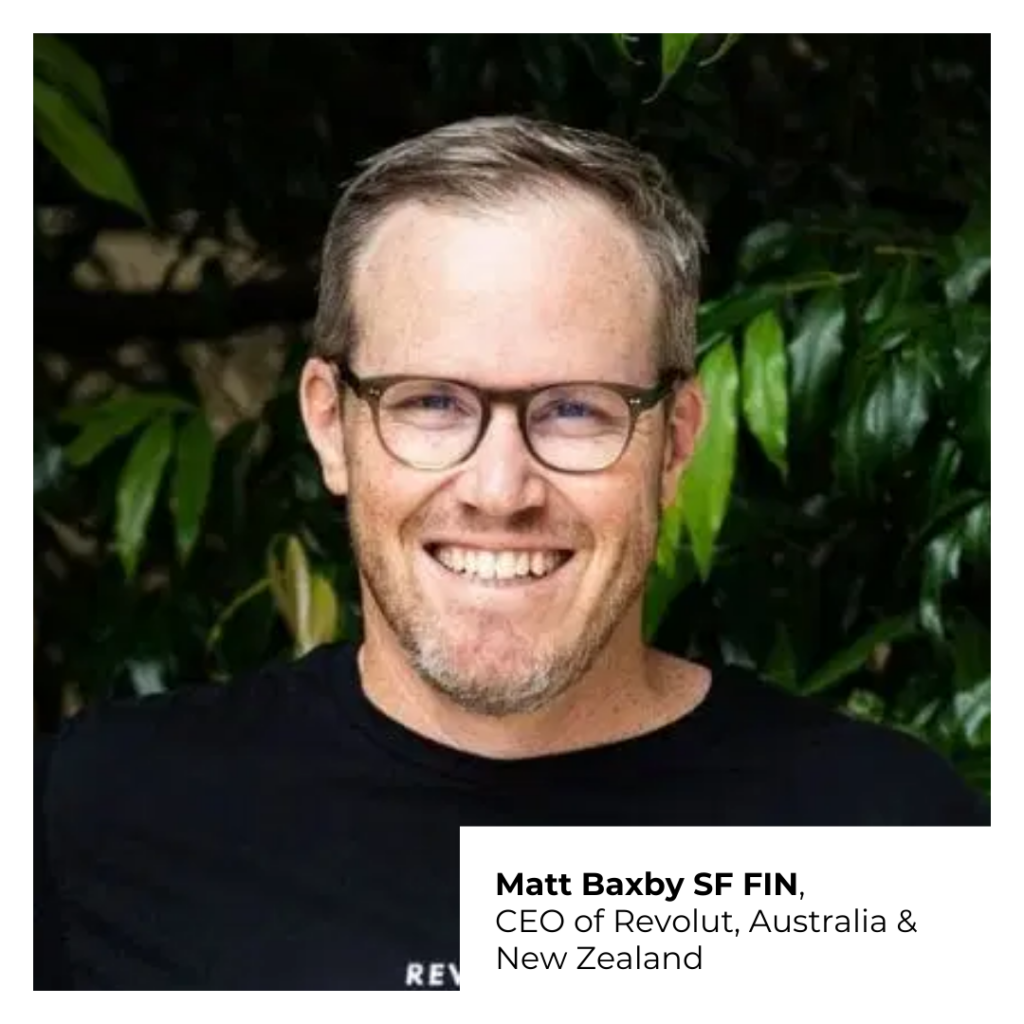
Fintech royalty, Revolut Australia chief executive officer Matt Baxby SF FIN,recently addressed the 2024 FINSIA AGM, generously sharing the story of his professional journey to date and his ambitions for the business.
Matt has been a FINSIA member for 20 years and in 2019 qualified as a Chartered Banker by Experience. In 2020, he was recognised for his contribution to the financial services industry and to FINSIA by being welcomed into the community of over 250 Senior Fellows.
Before moving into his current role, Matt was formerly Bank of Queensland CFO and managing director of Virgin Money Australia. He says FINSIA has supported his professional development as he has moved through his career.
“FINSIA brings together like-minded people together and creates a real sense of community for us,” he says.
For instance, Matt says FINSIA’s Young Finance Professionals committee in Brisbane, where he is based, is an active group with real momentum.
“That gives me confidence about the future. What sets us apart as members of a professional body is the desire to maintain really high professional standards, which framing this sense of community,” he says.
<subhead> Going digital
After working in more traditional financial services roles, Matt accepted a role at global fintech Revolut because he saw the market opportunity and generational shift in people wanting a different banking, financial services and payments’ experience.
“That creates an opportunity for a firm like Revolut to bring together a host of services so people can manage their entire financial life from one place. From a personal point of view, that was super interesting,” says Matt.
“Beyond that, being a technology firm operating in financial services, not the other way around, brings a completely different mindset to how we approach the market. So, we are well positioned in terms of tackling the generational shift happening in digital banking and to bring this to the market is pretty exciting.”
Security is front and centre for Matt and his team. “It’s incumbent on us to help customers protect themselves,” he says. The business is using new technologies like AI and sophisticated transaction monitoring to detect fraud and scams and keep customers safe.
<subhead> Working competitive advantage
As a digital-first business, Revolut has been able to build its tech stack from the ground up so it’s fit-for-purpose for customers.
“It’s a really different way of thinking that enables us to be more agile in what we deliver customers and the way we listen to feedback from them. We have a real technology mindset towards features,” he says.
Revolut’s software design and engineering team is based around the world, including teams in the UK and Europe and a regional network as well.
“That gives us the best chance of success because often really heavy localisation is required for things like gold payments and integrations. Maintaining compliance with AML rules also requires local nuance and understanding of regulations and the competitive landscape,” says Matt.
Although the business was forced to pivot from its foreign exchange focus during the COVID pandemic, this meant it could accelerate features that were right for the times.
“Consumers became very self-directed about their wealth. So we gave customers the ability to get exposure to cryptocurrency and trade US stocks. Then after borders re-opened, our business accelerated because people started traveling again and there was more demand for our foreign exchange services,” he adds.
Matt explains Revolut wants to continue to be a source of competition in banking and finance. He estimates the additional pressure the business has placed on incumbents has potentially saved consumers between $20 million and $25 million in fees.
Revolut has been really active in New Zealand and Matt says this market will also benefit from more competition and new entrants.
“There are points of friction in New Zealand, such as no real-time connectivity. This is an opportunity for Revolut because we offer a peer-to-peer payments platform anyone can use anywhere globally, instantly and for free. So we can cover up some of the gaps that exist in local payments.”
Many local fintechs and neobanks have come and gone over the years, especially in Australia. Their experience has been informative.
“Putting a team together, building the tech, raising the capital, becoming licensed and only then market testing is really hard to make work. So it’s not a surprise a few have tried and found it quite difficult. Our approach to entering any market is first to get some services into the market and prove out our build and our confidence around it,” says Matt.
It’s been a successful strategy, with Revolut enjoying strong growth in the use of its products across Australasia.
“Our growth in domestic spend transactions is showing us that people are using our products overseas and then coming home and continuing to use them. That gives us confidence we’re on the right track,” he says.
The Australian and New Zealand banking sectors and their consumers will no doubt benefit as Revolut continues to innovate and challenge the financial services sector to achieve its potential.
https://www.finsia.com/news-hub/infinance/revolut-continues-competitive-push-australasia
